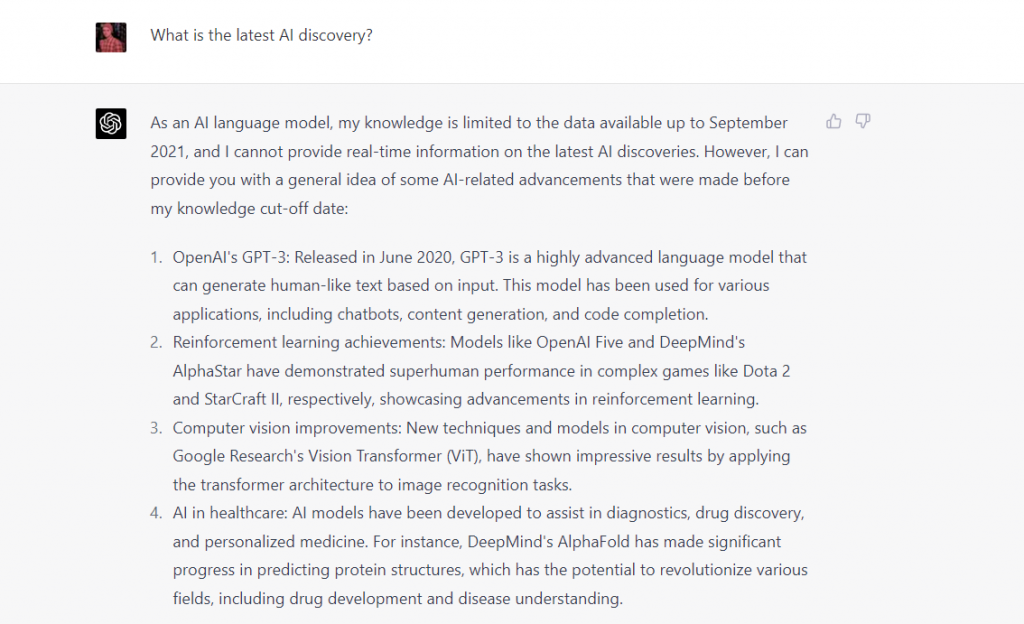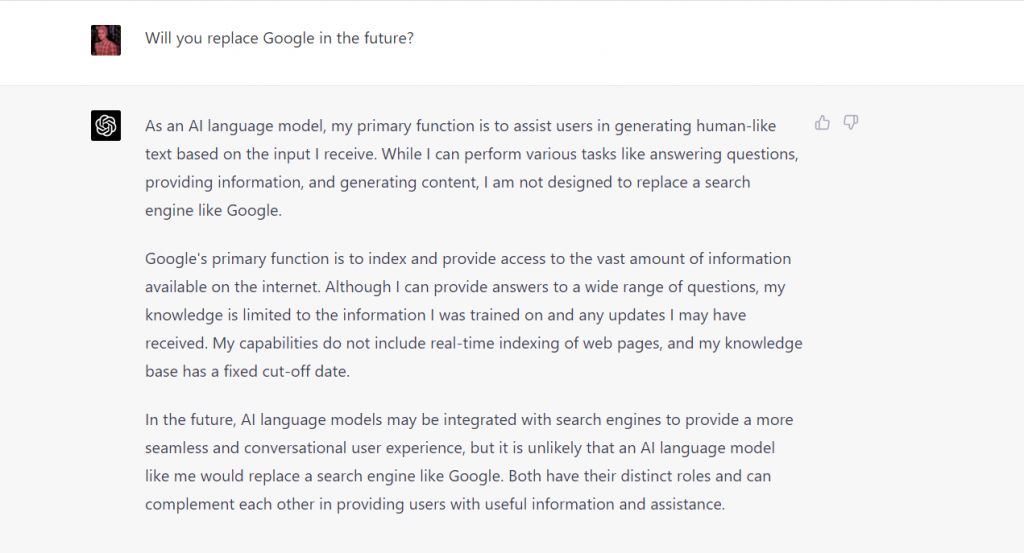

Is ChatGPT the Next Big Search Engine?
Written By Otilia Crizbasan | 21 March, 2023
How the AI-powered chatbot is changing the game and disrupting the search industry
Just a few months ago we wrote an article about the latest trends in marketing search without even mentioning ChatGPT. Yet, here we are today, witnessing this AI-powered chatbot taking the search industry by storm.
And it’s showing no signs of slowing down. OpenAI’s chatbot has broken all the records and has crossed 1 million users within one week of its launch. As if that is not impressive enough, in January 2023 ChatGPT crossed the 100 million users milestone.
Many are wondering if ChatGPT will be the next big search engine. This question has been on the minds of many in the search industry, and for good reason.
But how exactly does ChatGPT differ from traditional search engines like Google and Bing? And is it really a threat to them? In this article, we explore ChatGPT’s unique features and discuss the potential impact on the search industry.
How is ChatGPT revolutionising the search landscape?
- Unravelling the complexities of language
One of the most remarkable features of ChatGPT is its ability to grasp the intricacies of language, including colloquialisms and idioms. You can expect more accurate, natural and human-like responses compared to the often-mechanical results from search engines. It will feel more like a genuine conversation with a helpful (and really smart) friend.
- No more guesswork
ChatGPT excels at understanding questions and providing detailed, informative answers. Traditional search engines don’t give answers to questions conversationally. Open AI’s chatbot ensures you get the precise information you need, without any miscommunication or confusion.
- Venture beyond the surface
For a student trying to learn new concepts or a professional seeking to stay on top of industry trends, ChatGPT can be a unique and exciting way to learn. Its ability to address follow-up questions gives you more context and depth than search engines, turning your learning experience into an exciting and dynamic journey.
- Efficiency at its best
In today’s fast-paced world, time is of the essence. ChatGPT understands this, offering detailed responses and answering multiple questions in a single conversation. There’s no need to sift through numerous search engine queries to find the information you need. Now you can get what you are looking for in record time.
- Accessibility and versatility
ChatGPT’s true strength lies in its adaptability. It can be integrated into various platforms, such as Google Docs or Whatsapp, and is easily accessible via natural language input. That means no more struggling with keyword-based searches. ChatGPT’s user-friendly and accessible nature makes it a far more convenient and enjoyable tool than traditional search engines.
Does ChatGPT have any blind spots?
ChatGPT can write human-sounding essays, compose poetry, write code, give advice on how to become successful and explain quantum physics to a 3rd grader — all of this for free and in no time.
Despite being one of the most advanced conversational AI technologies available, it’s far from perfect. It has not yet reached the level of maturity required to dethrone Google.
Here are some of the critical blind spots that currently limit ChatGPT’s potential and the areas in which it needs improvement:
- The trust issue
One significant drawback of Open AI’s chatbot is the uncertainty surrounding the sources of the information. When using Google, users can easily identify and verify the sources behind the search results. However, with ChatGPT, it’s unclear what information feeds the AI. That’s why sometimes it’s challenging to determine the accuracy and reliability of its responses.
- The misinformation trap
ChatGPT’s predictive text model and ability to learn from user content make it more susceptible to providing false information. This potential risk highlights the need for ongoing improvements to ensure the AI offers accurate, verified, and up-to-date information.
- The knowledge gap
As it stands, ChatGPT is limited to the information it acquired before 2021 so its knowledge base is gradually becoming outdated. This leads to increasingly inaccurate or irrelevant responses. To remain cutting-edge, ChatGPT needs regular updates and access to current information sources.

Does the rise of ChatGPT mean the end for Google?
According to Luminr Head of Innovation, James Wolman, ChatGPT has the potential to disrupt the current search landscape for its unique approach to understanding user queries and providing relevant results.
“Some might argue it already is a search engine. I used it to recommend shops that fit a certain fashion aesthetic I’m looking for as I can be a lot more specific than I can on Google,” says Wolman. “If ChatGPT were to become a search engine, it would likely compete with Google search by offering a unique approach to understanding user queries and providing relevant search results.”
To compete effectively, ChatGPT would need to continually improve its capabilities and offer unique features that differentiate it from other search engines, learning from current data rather than a snapshot, explains Wolman. “At the moment ChatGPT doesn’t cite its sources but I expect that might change–the whole thing is very early days right now so it’s difficult to anticipate how this might evolve as the price of hosting these supermassive models comes down.”
We couldn’t miss the opportunity to ask the famous AI chatbot what it envisions about its future in relation to Google.

So while the current ChatGPT version doesn’t see itself as a threat yet, one thing is clear – the search race is on. Just look at Bing’s entry to the space last month with their new AI-powered Microsoft Bing and Edge.
While the technology is still not there yet for Bing, their announcement post did pique our interest. Yusuf Mehdi, Corporate Vice President & Consumer Chief Marketing Officer at Microsoft wrote in the announcement post that “There are 10 billion search queries a day, but we estimate half of them go unanswered. That’s because people are using search to do things it wasn’t originally designed to do. It’s great for finding a website, but for more complex questions or tasks too often it falls short.”
The big question at Luminr
What Mehdi wrote directly relates to our team’s thinking around the search space as a whole. With more and more evidence that users are going to other platforms for their searches, those in the search marketing space need to adopt a Total Search strategy.
Google is only one piece of the search puzzle. There are other players in the market to be keeping an eye on. TripAdvisor, Amazon, and recently TikTok have gained traction among users for specific types of searches.
Plus at the pace Google and Microsoft are adopting large language model AI into their search experience, it’s a pretty safe bet that AI will be another resource marketers need to prepare for as part of the Total Search landscape.
We are eager to see how ChatGPT will contribute to a brand’s visibility on the Internet so we can determine what role it plays in Luminr’s competitive intelligence offering.
Final thoughts
ChatGPT has emerged as a game-changing force in the search industry and offers a unique and engaging user experience.
While it is still uncertain how ChatGPT or other AI engines will ultimately affect Google search, its influence is undeniable. Its potential for disrupting the search landscape is substantial.
Marketers must keep an eye on the developments and growth of ChatGPT and similar AI technologies to stay ahead in the ever-evolving world of search.
Get in touch with our team to discover how we can help you own page one.





